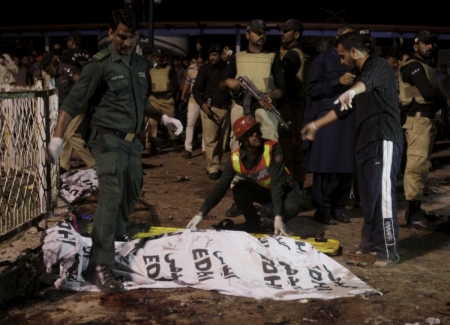Suicide bombing strikes Easter service in park

LAHORE, Pakistan (Reuters) – Pakistani authorities launched a hunt on Monday for militants behind a suicide bomb that killed at least 65 people in an attack that targeted Christians and was claimed by a Taliban faction that once declared ties with Islamic State.
Most of the victims of the bomb attack at a park in the eastern city of Lahore on Sunday evening were women and children enjoying an Easter weekend outing.
"We must bring the killers of our innocent brothers, sisters and children to justice and will never allow these savage inhumans to over-run our life and liberty," military spokesman Asim Bajwa said in a post on Twitter.
Officials said at least 65 people were killed and about 300 wounded. The death toll was expected to rise.
Pakistan has been plagued by militant violence for the last 15 years, since it joined a U.S.-led campaign against Islamist militancy after the Sept. 11, 2001, al Qaeda attacks on the United States.
A faction of the Pakistani Taliban called Jamaat-ul-Ahrar claimed responsibility for the attack, and issued a direct challenge to the government.
"The target was Christians," said a faction spokesman, Ehsanullah Ehsan, said.
"We want to send this message to Prime Minister Nawaz Sharif that we have entered Lahore."
The group has claimed responsibility for several big attacks after it split with the main Pakistani Taliban in 2014. It declared allegiance to the Islamic State but later said it was rejoining the Taliban insurgency.
While the army, police, government and Western interests have been the prime targets of the Pakistani Taliban and their allies, Christians and other religious minorities have also attacked.
Nearly 80 people were killed in a suicide bomb attack on a church in the northwestern city of Peshawar in 2013.
The security forces have killed and arrested hundreds of suspected militants under a major crackdown launched after Taliban gunmen massacred 134 children at a military-run school in Peshawar in December 2014.
Lahore is the capital of Pakistan's richest province, Punjab, and is widely seen as the political heartland of Sharif and his ruling party.
Sharif's office condemned the blast as a cowardly act and said a response had been ordered, without elaborating.
Pakistan's security agencies have long been accused of nurturing some militants to use for help in pursuing security objectives in Afghanistan and against old rival India.
The Pakistani Taliban are fighting to topple the government and install a strict interpretation of Islamic law.
Sharif's opponents have accused him of tolerating militancy in return for peace in his province, a charge he strongly denies.
(Reporting by Asad hashim; Writing by Robert Birsel; Editing by Simon Cameron-Moore)